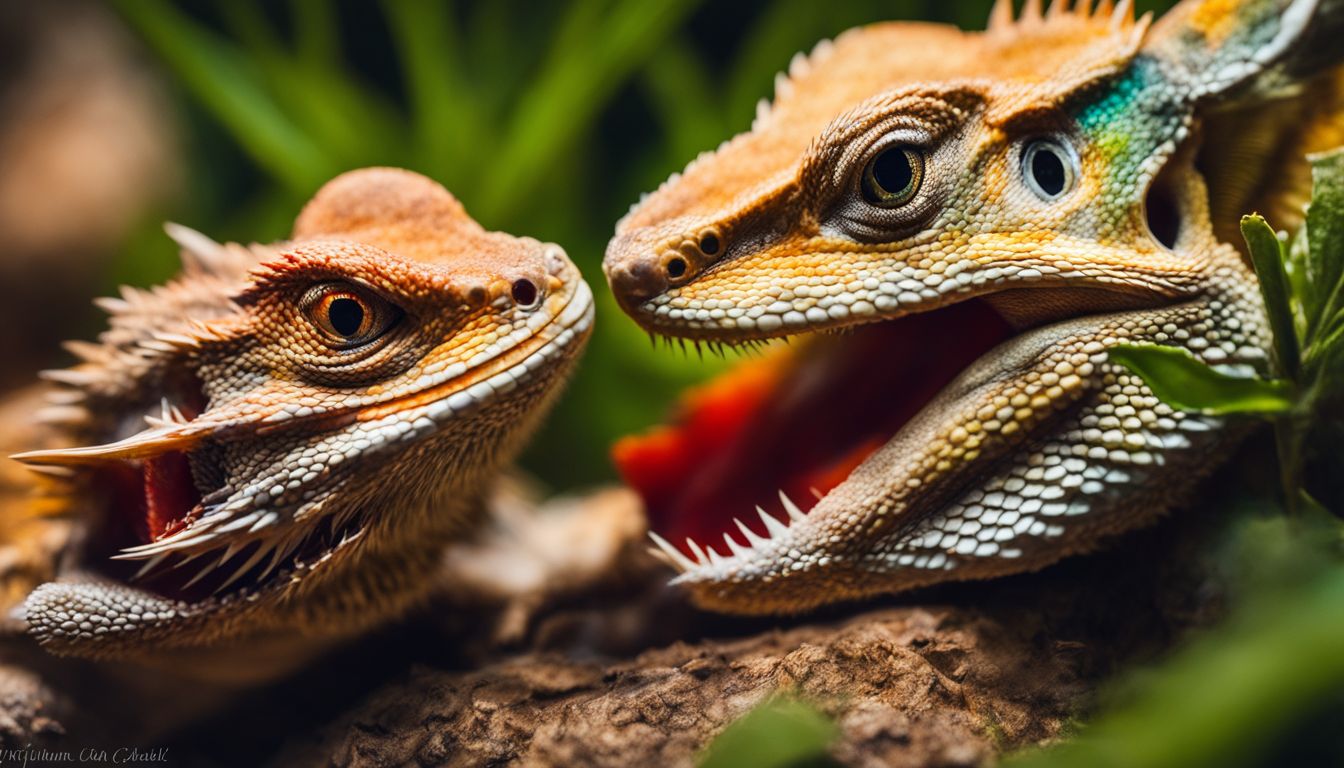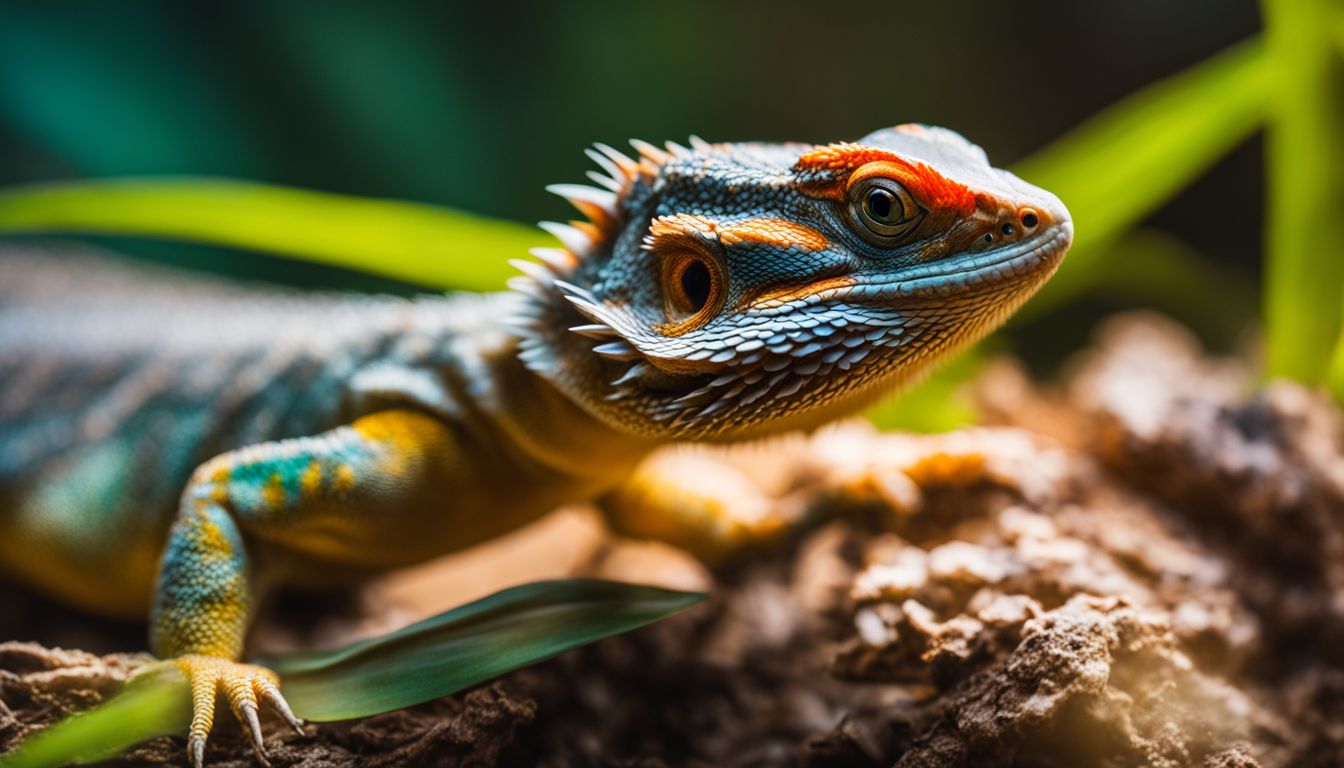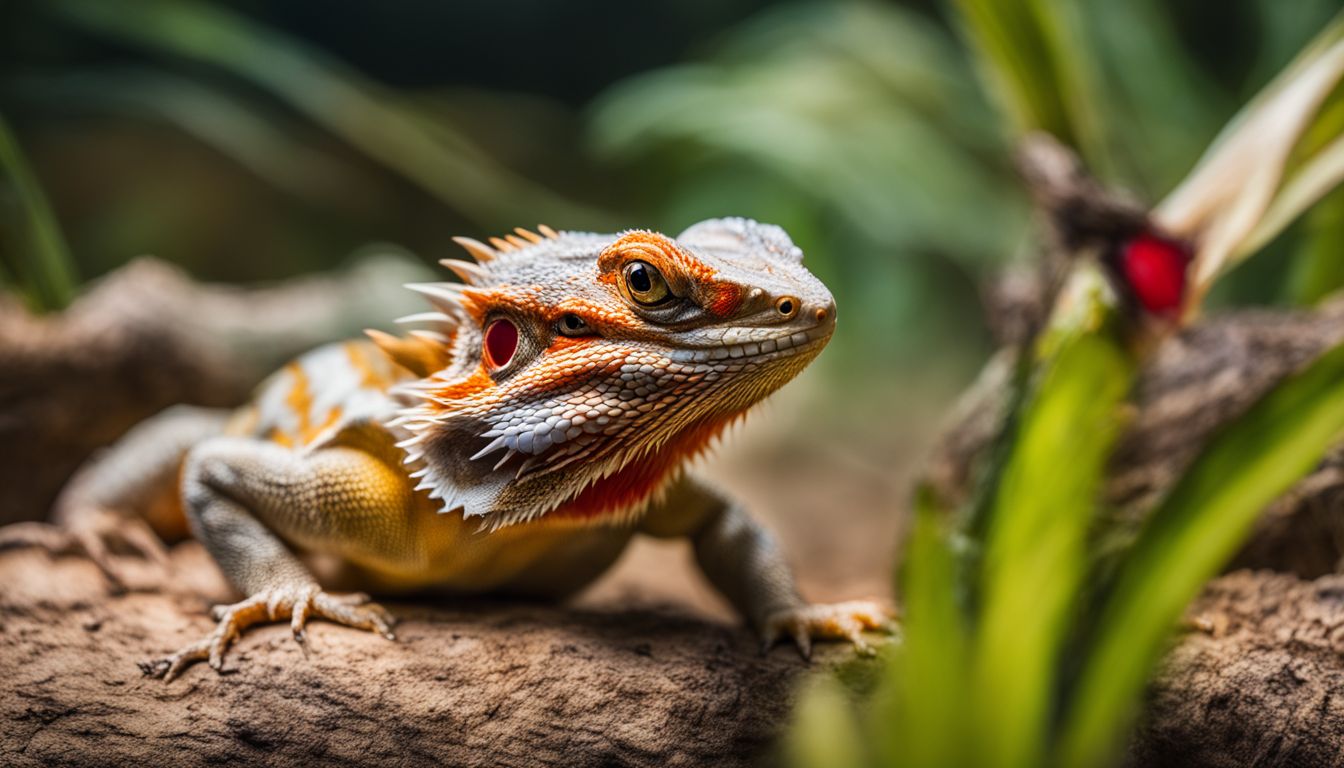Finding the right diet for your bearded dragon can feel like a tricky puzzle. Did you know that red wigglers are one option to consider? This post will guide you through everything from nutritional benefits to preparation tips for feeding red wigglers to your pet.
Stay tuned, and let’s explore together!
Understanding Red Wigglers

Red wigglers are a type of earthworm known for their role in composting. They break down organic material, turning it into nutrient-rich soil. These worms are small and red, making them distinctive from other types of earthworms.
High in protein and low in fat, red wigglers serve as an excellent food option for bearded dragons.
People choose red wigglers because they’re easy to find and can be a good part of a bearded dragon’s diet. These worms not only offer nutritional benefits but also add variety to the feeding schedule for bearded dragons.
Now, let’s discuss if it’s safe for your bearded dragon to eat these high-protein worms.
Can Bearded Dragons Eat Red Wigglers?

Bearded dragons can indeed eat red wigglers, making these worms a choice for feeding. They’re safe and offer a high protein punch beneficial to your pet’s diet. However, it’s key to understand that while they are nutritious, they shouldn’t be the main meal but rather an occasional treat.
Feeding them once every one to two weeks is ideal.
Offering live food like red wigglers stimulates your bearded dragon’s natural hunting instincts. This activity not only nourishes but also keeps them active and engaged. Keep in mind the size of the worms—adjusting is crucial to ensure they’re suitable for your reptile friend.
Nutritional Benefits of Red Wigglers for Bearded Dragons
Red wigglers are packed with high protein and essential amino acids, making them a nutritious addition to your bearded dragon’s diet. Read on to discover more about why these worms can benefit your pet’s health.
High Protein Content
Red wigglers pack a powerful protein punch, making them an excellent choice for your bearded dragon’s diet. This high-quality protein is crucial for muscle growth and overall health in reptiles.
Unlike other worms that may have higher fat content, red wigglers are lean, ensuring your pet gets all the benefits of protein without the risk of excess fat.
They not only provide essential amino acids but also contribute significantly to a balanced reptile diet. High-protein feed like red wigglers supports active lifestyles and helps in tissue repair, making it a nutritious live food option.
By incorporating these calcium-rich insects into their meals, you’re setting up your bearded dragon for a healthier life full of vitality.
Essential Amino Acids
Essential amino acids are crucial for the health of bearded dragons. These include arginine, leucine, and lysine – all necessary for their optimal nutrition. Red wigglers are a valuable source of these essential amino acids, contributing to the overall nutritional benefits for bearded dragons.
These nutrients aid in energy metabolism and digestive health while supporting their balanced diet. Additionally, red wigglers provide vital nutritional requirements that help meet the dietary needs of bearded dragons.
Nutrient-Rich
Red wigglers are nutrient-rich, providing essential nutrients like protein and calcium for bearded dragons. These worms offer dietary diversity and are a beneficial addition to their diet due to their high protein content, surpassing 4%.
Red wigglers also contain essential amino acids necessary for the well-being of bearded dragons, making them a valuable source of nutrition for these reptiles.
These worms contribute to the hydration of bearded dragons owing to their high moisture content. Additionally, superworms with approximately 19% protein serve as a suitable nutrient-rich food source for beardies.
Preparing Red Wigglers for Bearded Dragons
Preparing Red Wigglers for Bearded Dragons involves sourcing healthy red wigglers from reputable suppliers, followed by gut loading them with nutritious foods and dusting them with calcium and vitamins before feeding them to your pet.
Ensuring the worms are well-fed and enriched with essential nutrients will contribute to your bearded dragon’s overall health and well-being.
Sourcing Red Wigglers
To source red wigglers for your bearded dragon, ensure you obtain them from reputable suppliers to avoid potential risks like parasite infections. Look for suppliers who prioritize cleanliness and quality control to provide safe and healthy worms.
Additionally, consider creating a worm farm at home as a sustainable option for a fresh supply of red wigglers while ensuring they are free from harmful substances or contaminants.
When purchasing red wigglers, inquire about the supplier’s farming practices and the quality of their vermicomposting process to guarantee the worms’ suitability for feeding your bearded dragon.
Gut Loading
Before feeding red wigglers to your bearded dragon, it’s crucial to ensure they are packed with essential nutrients like protein and calcium. This process, known as gut loading, involves providing the worms with a nutritious diet that will benefit your pet.
By doing so, you’re essentially enhancing the nutritional value of the feeder insects before they become a meal for your bearded dragon. Gut loading not only ensures that the red wigglers offer vital nutrients but also allows you to tailor their diet to meet the specific dietary needs of your reptile friend.
Feeding well-nourished red wigglers enriched through gut loading positively impacts your bearded dragon’s overall health and supports its dietary requirements. It’s an important step in ensuring that your pet receives a balanced and nutritious diet, thus contributing significantly to its wellbeing.
Dusting with Calcium and Vitamins
Dusting red wigglers with calcium powder is crucial for providing your bearded dragon with essential nutrients. The calcium helps support their bone health, especially important during their growth stage.
In addition to calcium, dusting the red wigglers with a vitamin supplement ensures that your pet receives all necessary micronutrients for overall well-being and vitality.
After preparing the red wigglers by gut loading them, make sure to lightly coat them with the calcium and vitamin powder before feeding them to your bearded dragon. This simple step significantly boosts the nutritional value of these worms, benefiting the reptile’s diet immensely while supporting its long-term health.
Potential Risks of Feeding Red Wigglers to Bearded Dragons
Feeding red wigglers to bearded dragons can pose potential risks, mostly in terms of size and age suitability. These worms vary in size, and if they’re too large, they might lead to choking or blockage in the dragon’s digestive system.
This risk is amplified for baby dragons since their smaller bodies may struggle with larger prey. Moreover, unbalanced nutrition from red wigglers could result in malnourishment for your beardie.
It’s essential to consider the nutritional needs of your pet before introducing any new food into its diet.
In addition to these potential risks, superworms are also not recommended as a staple insect for bearded dragons due to the possibility of gut impaction, especially for young ones.
Therefore, it’s crucial to be mindful of the size and nutritional content of feeder insects when considering incorporating them into your dragon’s diet. Understanding these potential dangers will help ensure that you provide a safe and balanced diet for your beloved reptile companion while avoiding unnecessary health issues.
Conclusion
In conclusion, bearded dragons can eat red wigglers. These worms provide a good source of protein and essential nutrients for your pet. Remember to offer them in moderation and ensure they are appropriately sized for your dragon’s age.
With proper preparation and cautious feeding frequency, red wigglers can be a beneficial addition to your bearded dragon’s diet!
Discover more about your pet’s diet by exploring whether bearded dragons can eat spaghetti squash.
FAQs
1. Can bearded dragons eat red wigglers?
Yes, bearded dragons can eat red wigglers as part of their diet.
2. Are red wigglers a suitable food for bearded dragons?
Red wigglers are a nutritious and suitable food option for bearded dragons.
3. How often should I feed red wigglers to my bearded dragon?
You can feed your bearded dragon red wigglers 2-3 times per week as part of a varied diet.
4. Do I need to prepare the red wigglers before feeding them to my bearded dragon?
Before feeding, it’s best to dust the red wigglers with calcium powder for added nutrition.
5. What size of red wiggler is appropriate for a bearded dragon to consume?
Choose appropriately-sized red wigglers based on the size of your bearded dragon – they should not exceed the width between its eyes when fully grown.




